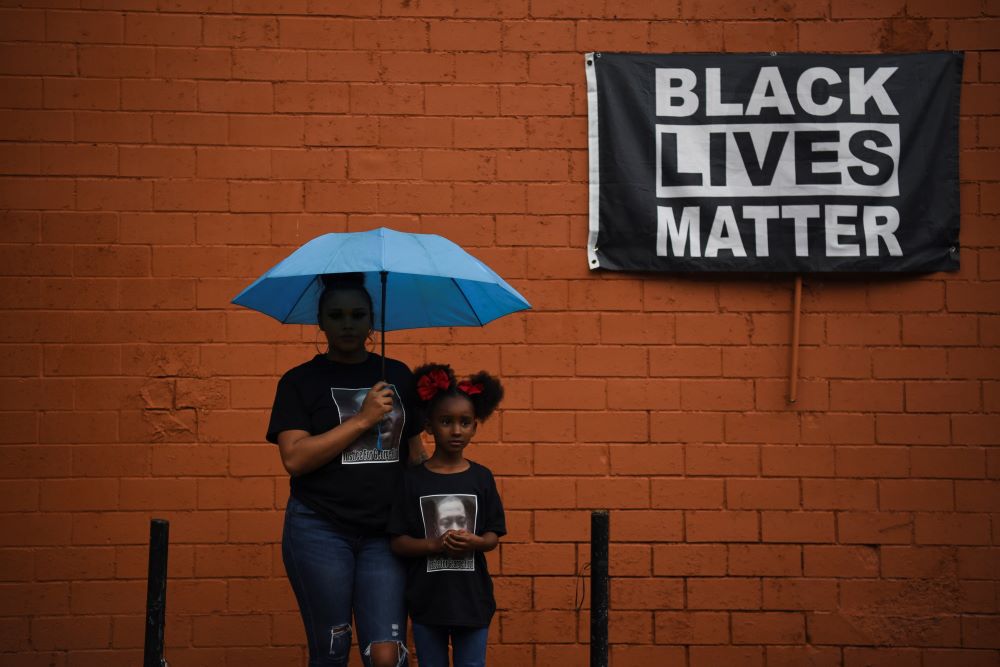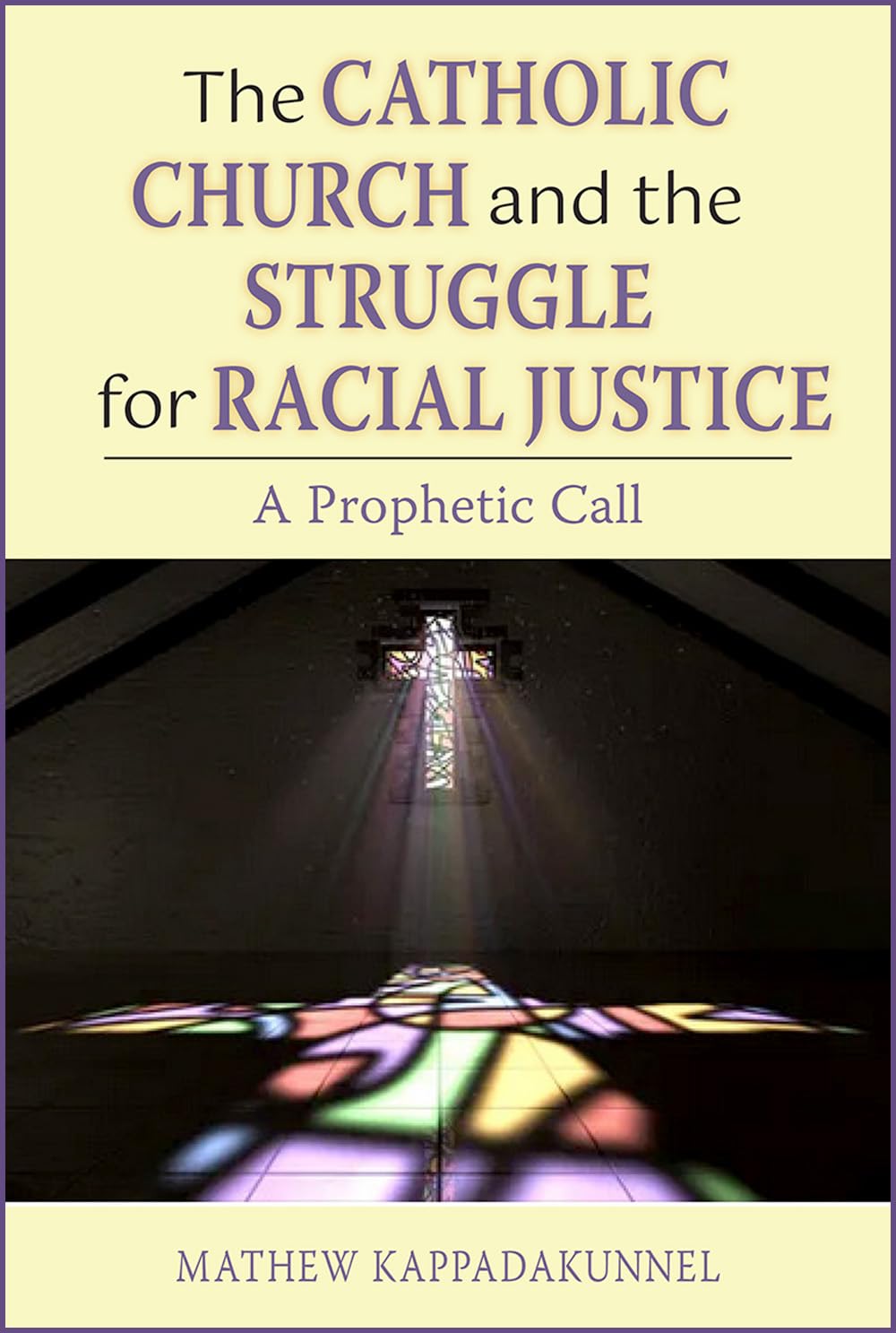
Brittany Elmore of Houston poses for a photo with her daughter Brooklyn near a "Black Lives Matter" sign May 23, 2021, as Catholic and other faith leaders marked the first anniversary of George Floyd's May 25, 2020, murder by a police officer in Minneapolis. (CNS/Reuters/Callaghan O'Hare)
In The Catholic Church and the Struggle for Racial Justice: A Prophetic Call, Mathew Kappadakunnel offers a unique perspective as a first-generation American of South Indian descent, who is a member of the Syro-Malabar Catholic Church.
As a brown-skinned son of immigrants, Kappadakunnel once assumed his "place in society was that of an outsider," but he also admits there was a time when he looked down on people who crossed the Mexican border without documentation for not immigrating legally, like his parents. It was only when he spent time on the Mexican side of Nogales with a Catholic initiative called El Comedor that Kappadakunnel experienced a conversion of heart and mind. There, he encountered people — God's people — who were "desperate, trying to escape treacherous circumstances that threatened their lives, their safety, and their families," and he was filled with compassion and understanding for their plight.

Likewise, it wasn't until the death of George Floyd in 2020 that Kappadakunnel felt called to speak out against anti-Black racism. For most of his life he assumed the role of the "model minority," which meant he would "fall in line with American society" and align with "white American beliefs and values." For him, "recognizing and challenging racism in both society and the Church" were considered taboo.
Kappadakunnel describes his former belief that social justice was the responsibility of nonprofit organizations, while his vocation was prayer and leading people to Jesus. Then during the pandemic, after watching a video that showed a police officer callously murder Floyd, Kappadakunnel realized that he was not living in a post-racial society. He knew he had to speak out against racial injustice. Written in a prophetic voice, The Catholic Church and the Struggle for Racial Justice is Kappadakunnel's forceful and compelling plea for all Catholics still asleep to wake up.
Advertisement
Kappadakunnel also gets personal. He relays how the Eurocentric teachings of St. Francis Xavier, a Spanish Jesuit missionary who arrived in Goa, India, in 1540, led him to internalize harmful, negative views of fellow Indian people. Though Xavier is still revered by many Indians today, in the 16th century he wrote about Goan people in ways that can only be described as racist.
For example, in The Letters and Instructions of Francis Xavier, Xavier wrote that Indians made for poor vocations due to their lack of commitment — both to the order and to celibacy. Xavier also made more explicitly colorist condemnations of Goans' skin color writing: "[Indians] being black themselves, consider their own color the best, they believe that their gods are black ... the great majority of their idols are as black as black can be ... and seem to be as dirty as they are ugly and horrible to look at."
Kappadakunnel humbly repents of his past view of himself as superior to Indian people since he was American born. His honesty may resonate with Catholic readers who hold their own internal bias and spur them to an examination of conscience.
Aside from his personal story of conversion and spiritual awakening, Kappadakunnel's book is a clarion call urging all Catholics to work toward racial and social justice. It convincingly makes the case that the Catholic Church is not only universal and therefore multicultural, but that her diversity is one of the reasons the church was able to spread to all corners of the world and last until today. Racism and discrimination, therefore, are clear contradictions to Catholicism and God's kingdom.
After making the case for why racism is incongruous with Catholicism, Kappadakunnel critically examines the U.S. Catholic Conference of Bishops' writings and actions on the topic of racism. He delves into the world of prominent, wealthy conservative donors that are heavily influencing the direction of the Catholic faith. When he discusses the Napa Institute's annual conference at Timothy Busch's Meritage Resort and Spa in Napa Valley — an event with registration that costs nearly $2,000 and nightly rates over $500 — Kappadakunnel states, "Based on the criteria of this conference, Jesus would not have been welcomed, since his message encompassed inviting 'the poor, the crippled, the lame and the blind' to the banquet (Luke 14:13), none of whom would be able to attend ..."
My biggest critique of the book involves the repeated references to working with the Black Lives Matter Global Network (BLMGN), which has in many respects fallen from grace and lost much public support. Black Lives Matter Grassroots organizations, a collective of community groups across the country, sued BLMGN, claiming had fundraised off the work of the chapters, but mismanaged the funds and had shut local chapters out of decision making and profits. The lawsuit was dismissed, However, while Black Lives Matter as a global network has diminished in power and efficacy, the truth that Black Lives Matter and the convictions behind the statement still remain true and relevant today.
Overall, I commend Kappadakunnel for his book and believe it would be beneficial for Catholics to read.





